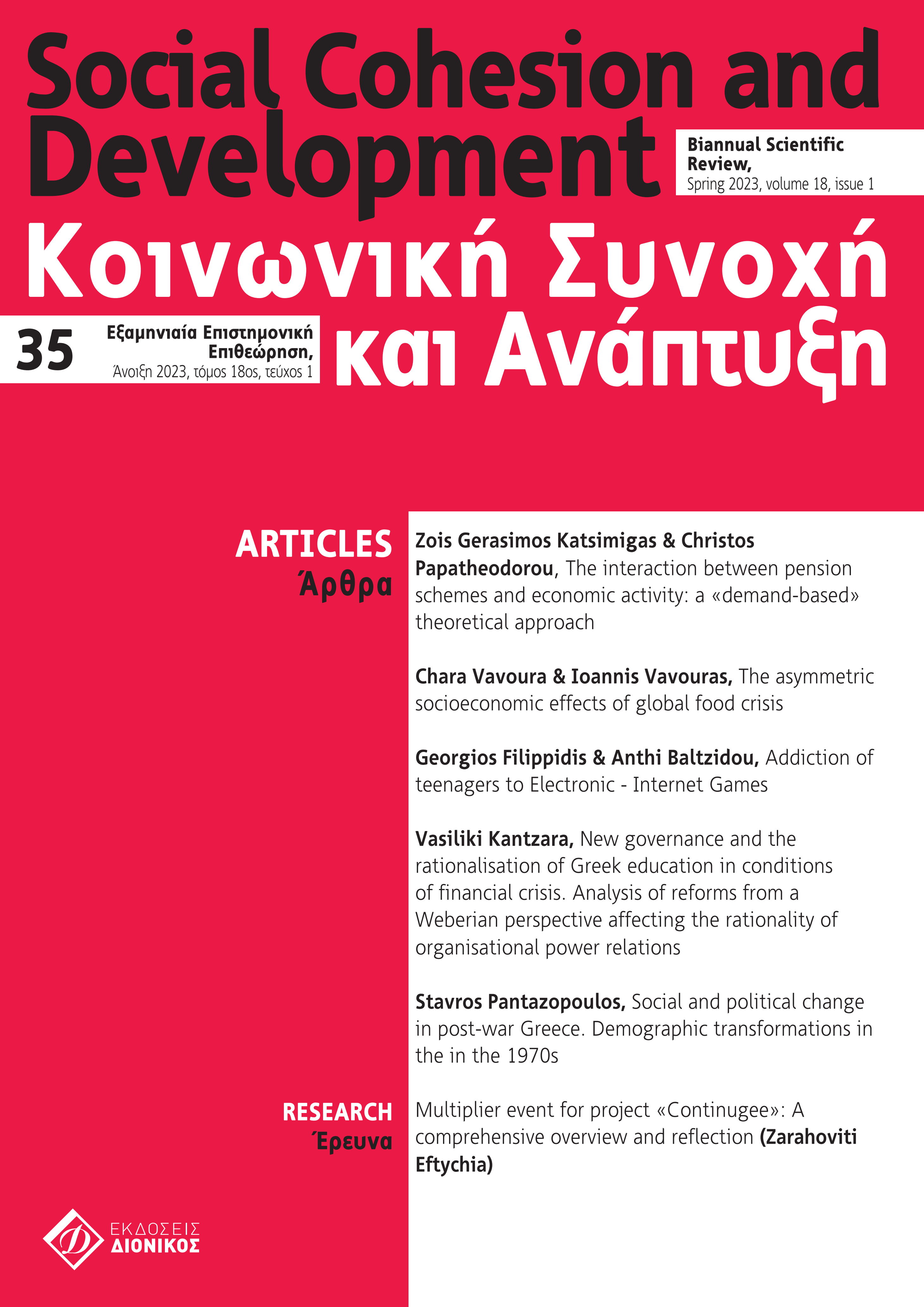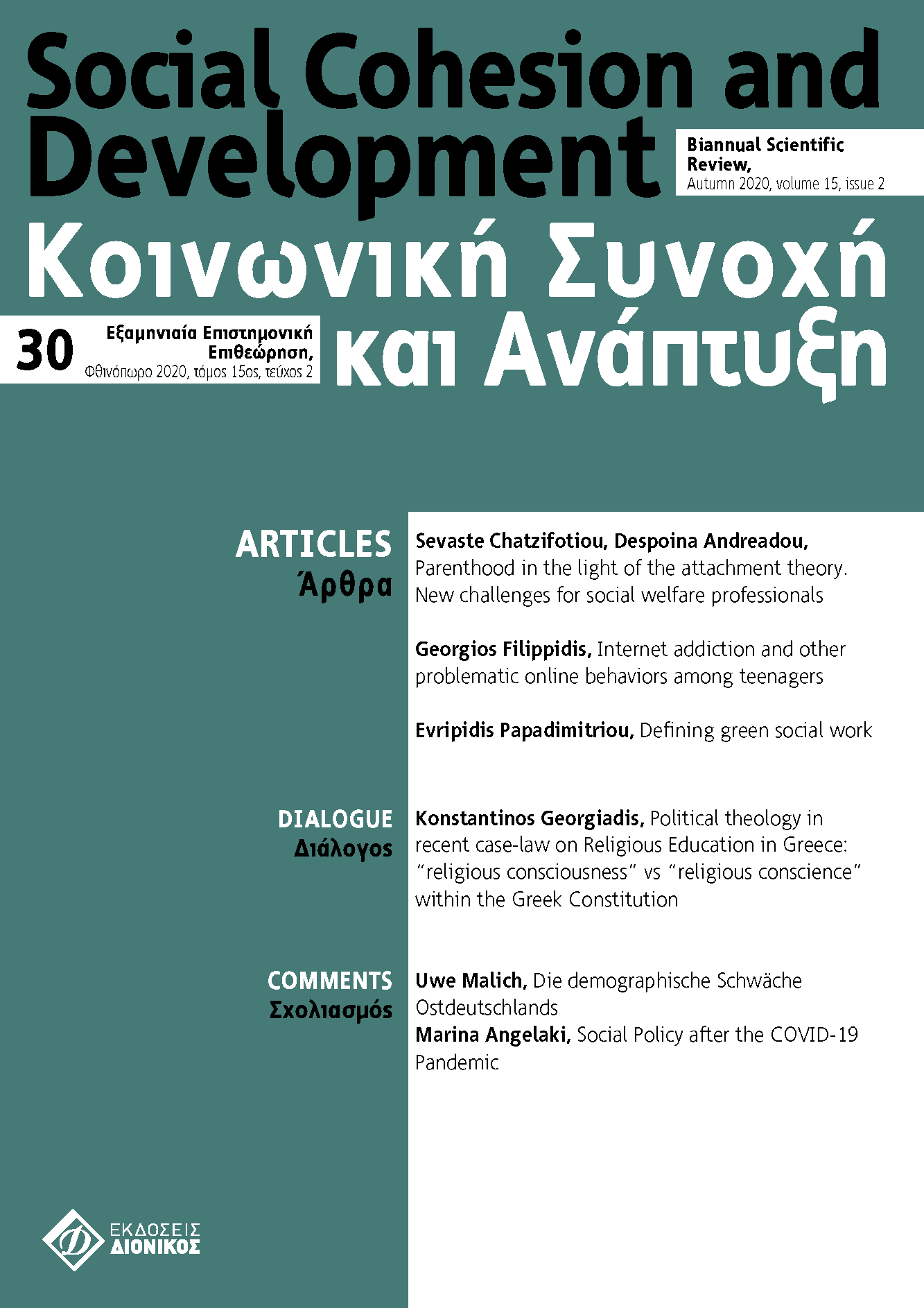Εθισμός ανηλίκων στα ηλεκτρονικά – διαδικτυακά παιχνίδια. Έρευνα σε μαθητές πρωτοβάθμιας εκπαίδευσης

Περίληψη
Ο ηλεκτρονικός υπολογιστής και το Διαδίκτυο
αποτελούν πλέον καθημερινό και αναπόσπαστο
πλαίσιο της ζωής των παιδιών και των εφήβων.
Προέκταση αυτών είναι τα ηλεκτρονικά παιχνίδια,
βασικό είδος ψυχαγωγίας και επικοινωνίας των
νέων με τους συνομηλίκους τους. Το περιεχόμενό
τους είναι διασκεδαστικό, ωστόσο η μη οριοθετη-
μένη χρήση τους δύναται να αποτελέσει αιτία για
την εκδήλωση εξαρτητικών συμπεριφορών και να
επιδράσει αρνητικά στην ευαίσθητη προσωπικότη-
τα των ανηλίκων. Το παρόν άρθρο, λοιπόν, πραγ-
ματεύεται το περιεχόμενο των ηλεκτρονικών - δι-
αδικτυακών παιχνιδιών και ερευνά πότε ο ρόλος
τους καθίσταται επιβλαβής για τη σωματική, κοινω-
νική και ψυχική υγεία των παιδιών
Λεπτομέρειες άρθρου
- Πώς να δημιουργήσετε Αναφορές
-
Filippidis, G., & Mpaltzidou, A. (2023). Εθισμός ανηλίκων στα ηλεκτρονικά – διαδικτυακά παιχνίδια. Έρευνα σε μαθητές πρωτοβάθμιας εκπαίδευσης. Κοινωνική Συνοχή και Ανάπτυξη, 18(1), 31–51. https://doi.org/10.12681/scad.37324
- Τεύχος
- Τόμ. 18 Αρ. 1 (2023): Νο 35
- Ενότητα
- Άρθρα

Αυτή η εργασία είναι αδειοδοτημένη υπό το CC Αναφορά Δημιουργού – Μη Εμπορική Χρήση – Παρόμοια Διανομή 4.0.
Οι συγγραφείς των άρθρων που δημοσιεύονται στην Κοινωνική Συνοχή και Ανάπτυξη διατηρούν τα δικαιώματα πνευματικής ιδιοκτησίας επί των άρθρων τους, δίνοντας στο περιοδικό το δικαίωμα της πρώτης δημοσίευσης. Άρθρα που δημοσιεύονται στην Κοινωνική Συνοχή διατίθενται με άδεια Creative Commons 4.0 και σύμφωνα με την άδεια μπορούν να χρησιμοποιούνται ελεύθερα, με αναφορά στο/στη συγγραφέα και στην πρώτη δημοσίευση για μη κερδοσκοπικούς σκοπούς και με δικαίωμα τροποποίησης μόνον με παρόμοια διανομή (αν αναμείξετε, τροποποιήσετε, ή δημιουργήσετε πάνω στο υλικό, πρέπει να διανείμετε τις δικές σας συνεισφορές υπό την ίδια άδεια όπως και το πρωτότυπο).


